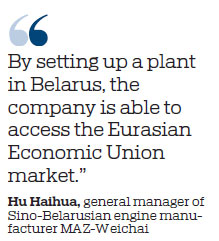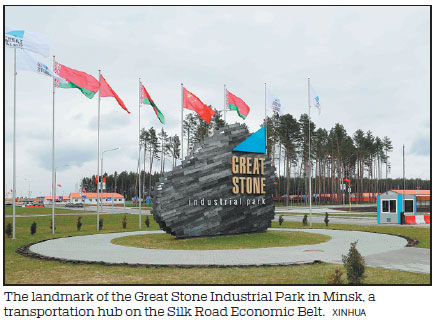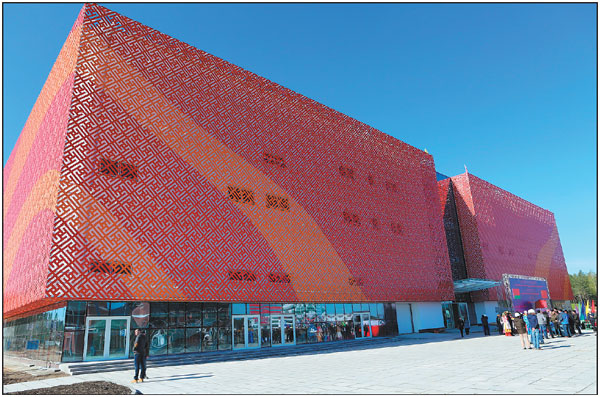Belarus, a gateway to Europe
Chinese companies tap an industrial park in Minsk to expand overseas
Some of the expanding Chinese companies have made Belarus their gateway to the broader European market. And making this possible is the Great Stone Industrial Park in Belarusian capital Minsk, which is enhancing cooperation between the two countries, industry insiders said.
Also known as the China-Belarus Industrial Park, it is the largest China-invested overseas economic and trade park. It is also Belarus' largest China-invested project.
A transportation hub on the Silk Road Economic Belt, the park acts as a portal to companies in Asia seeking to enter the European Union market, which boasts a population of 500 million.
By now, 43 companies have set up shops in the park and made a committed investment of $1 billion across industries such as telecommunications, pharmaceuticals, chemicals, engineering, e-commerce, big data storage and chemical processing.
Besides a central and convenient location, the park offers income tax exemption for up to 10 years, and zero property and land tax.

So far, it has attracted 26 Chinese companies, including China Merchants Group, Huawei, Weichai Group, Zoomlion Heavy Industry Science and Technology Co.
"Belarus is located in Central Europe, which can help bring our products to the large European market," said Du Xiaofeng, vice-president of Chengdu Xinzhu Road and Bridge Machinery Co Ltd, one of the first to settle in the park back in 2015.
The company has equipped 20 buses in Minsk with its super capacitors, a new energy-storing device that can support the buses to run 20 to 30 kilometers after charging for about six minutes, according to Du.
Such products brought the first super capacitors-fueled buses to the country, he said, adding the business is expanding to surrounding countries, such as Russia and Serbia.
Annual production of super capacitors of Chengdu Xinzhu in the park is about 1 million units, to serve 300 new energy-fueled buses. Output value is expected to surpass $35 million every year, which can further bring job opportunities and tax revenue to the local market, the company said.
In November, Weichai Group, an automobile and equipment manufacturing group, announced its diesel engine factory in the park began operations, with annual production of 20,000 units.
The diesel engines will be used in trucks, cars, engineering machinery and agricultural equipment.
"By setting up a plant in Belarus, the company is able to access the Eurasian Economic Union market," said Hu Haihua, general manager of Sino-Belarusian engine manufacturer MAZ-Weichai, in a previous interview with China Daily.
The products will be sold in Belarus and nearby countries such as Russia and Ukraine. Weichai's sales revenue in Belarus is also expected to grow from $3 million in 2016 to about $10 million in 2018 (data for which is yet to be finalized), Hu said.
China Merchants Group joined the park in 2015 as a shareholder with an investment of $500 million to provide logistics services for companies there.
By now, its 34,000 square-meter warehouses have been rented out. Its commercial center provides space for large-scale conferences. It also cooperates with Belarus customs to provide clearances, examination and delivery services.
Du Baozhong, general manager of China Merchants Group's China-Belarus Commerce and Logistics practice, said joining the park was an important step to develop overseas markets and one way to implement the Belt and Road Initiative.
According to Alexander Yaroshenko, head of the Great Stone Industrial Park Administration, resident companies are exempted from paying income tax for 10 years from the moment of turning profitable.
From the time tax becomes payable till 2062, the tax rate would be half of normal. Till the year 2062, they do not have to pay any real estate and land taxes. The rate of income tax for the park's residents is reduced to 9 percent, he said.
"The advantageous geographical location and logistics infrastructure development allow our park to play an important role as a transport hub," he said. "It gives an opportunity to build a green channel through our country for products, including those that will be produced in the park, to the EU and EEU markets."
The park expects resident companies to increase to 100 by 2021 with an area of 850 hectares. New jobs will be created for more than 6,500 people. By 2025, a residential block for 10,000 people will be built, Yaroshenko said.
Xing Yi contributed to this story.
chenmeiling@chinadaily.com.cn
|
Chinese construction engineers stand in front of the business and trade logistics park exhibition center at the China-Belarus Industrial Park in Minsk, capital of Belarus. Xinhua |

(China Daily 03/04/2019 page10)



















